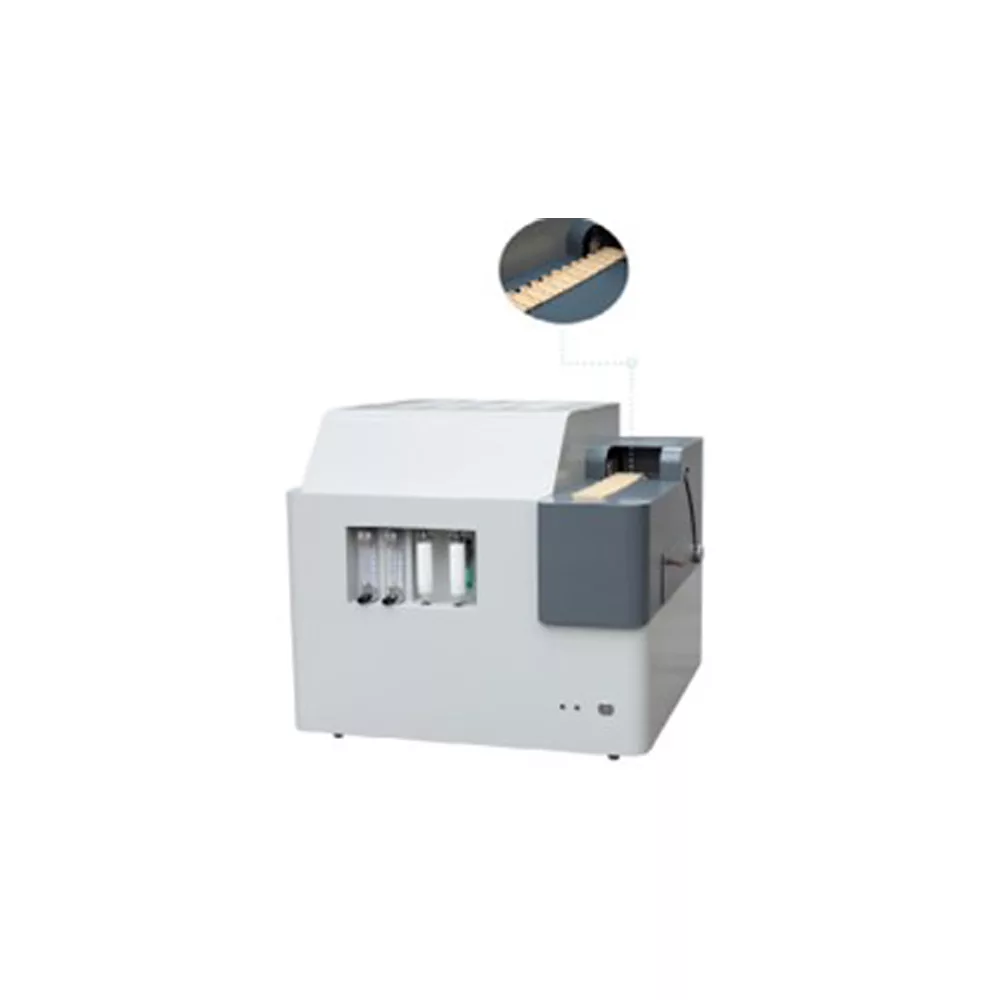Sulfur Analyzer: A Key Tool for Precise Sulfur Content Measurement in Laboratories
Sulfur Analyzer KSA/A/10 is an advanced piece of laboratory equipment essential for determining the sulfur content in a variety of materials, including fuels, petrochemicals, coal, and other industrial products. Accurate sulfur analysis is critical for industries such as energy, refining, metallurgy, and environmental science due to the impact of sulfur on product quality, regulatory compliance, and environmental sustainability. In this comprehensive guide, we’ll explore what sulfur analyzers are, their key applications, features, benefits, and how to select the right one for your laboratory needs.
What is a Sulfur Analyzer?
A sulfur analyzer is an instrument designed to measure the sulfur concentration in samples through various techniques, such as combustion, ultraviolet fluorescence, or X-ray fluorescence (XRF). These analyzers are crucial for quality control, environmental monitoring, and meeting legal sulfur limits set by governing bodies.
The method employed by the analyzer depends on the sample type and required precision. For example, UV fluorescence is commonly used for petroleum products, while combustion methods are preferred for coal and similar solid materials. Regardless of the technique, the goal of a sulfur analyzer is to provide rapid, accurate, and repeatable results for sulfur content analysis.
Key Features of a Sulfur Analyzer KSA/A/10
- High Sensitivity and Precision
Sulfur analyzers are equipped with highly sensitive detectors, capable of detecting sulfur in concentrations ranging from low parts-per-million (ppm) to percent levels. This precision is crucial for industries like oil refining and petrochemicals, where even trace amounts of sulfur can impact product performance. - Multiple Analysis Methods
Modern sulfur analyzers offer a variety of methods, including:- Combustion Method: Where the sample is burned in an oxygen-rich environment, and sulfur oxides produced are measured to calculate sulfur content.
- UV Fluorescence: Often used for liquid hydrocarbons, this method detects sulfur by measuring the fluorescence emitted when sulfur dioxide (SO₂) absorbs ultraviolet light.
- X-ray Fluorescence (XRF): A non-destructive technique ideal for solid samples, where sulfur content is determined by analyzing the emitted X-ray signals when a sample is exposed to X-rays.
- Wide Range of Sample Types
Sulfur analyzers can handle various sample forms, including liquids, solids, and gases. This versatility allows for testing in sectors ranging from fuel refining to coal analysis and environmental air monitoring. - Fast Analysis Times
These instruments are designed for high throughput, with some models capable of delivering results in just minutes, making them ideal for both research labs and industrial environments where time is critical. - User-Friendly Interface and Automation
Many sulfur analyzers feature intuitive interfaces, pre-programmed methods, and automation options that simplify operation, reduce the chance of human error, and enhance efficiency in the lab. They may also include data storage options for easy report generation and compliance documentation.
Applications of Sulfur Analyzers
Sulfur analyzers play an essential role across a variety of industries. Here are some of the key applications:
1. Petroleum and Refining Industry
In the petroleum industry, sulfur content is a crucial parameter in refining processes and fuel production. High sulfur levels in crude oil and refined fuels like diesel and gasoline can cause corrosion in engines, pipelines, and industrial equipment, in addition to contributing to harmful emissions such as sulfur dioxide (SO₂). Sulfur analyzers ensure that sulfur levels in fuels meet regulatory standards and optimize refining processes for better quality and efficiency.
2. Energy Sector and Coal Analysis
For coal-fired power plants and other energy facilities, sulfur content plays a critical role in combustion efficiency and environmental compliance. Sulfur in coal contributes to acid rain formation through SO₂ emissions. Sulfur analyzers provide precise measurements of sulfur in coal and coke, enabling facilities to comply with environmental regulations while optimizing energy production processes.
3. Environmental Monitoring
Sulfur analyzers are also essential in environmental science, where monitoring sulfur levels in air, soil, and water is important for assessing pollution and its impact on ecosystems. Measuring sulfur emissions from industrial processes, vehicles, and other sources helps guide environmental policies and regulations.
4. Metallurgy
In metallurgical industries, sulfur content in raw materials such as ores, concentrates, and slags is monitored to avoid corrosion in products like steel and to enhance material properties. Analyzers ensure that sulfur levels are controlled during production, improving the overall quality of metals.
5. Chemical Manufacturing
In the production of chemicals, including sulfuric acid and fertilizers, accurate sulfur measurements are vital for both product quality and safety. Sulfur analyzers are used to control sulfur content in raw materials, intermediates, and final products.
Benefits of Using a Sulfur Analyzer
1. Regulatory Compliance
Sulfur levels in fuels, industrial emissions, and various other products are strictly regulated in many countries due to their environmental and health impacts. Sulfur analyzers ensure that manufacturers and facilities meet these legal limits, avoiding fines, penalties, and product recalls.
2. Enhanced Product Quality
High sulfur content can degrade product quality, particularly in fuels, lubricants, and metals. By providing precise sulfur measurements, these analyzers help maintain the integrity and performance of materials, leading to higher customer satisfaction and fewer product failures.
3. Environmental Protection
By monitoring and controlling sulfur emissions, industries can minimize their environmental footprint. Sulfur analyzers play a direct role in reducing SO₂ emissions that contribute to air pollution and acid rain, supporting sustainability efforts.
4. Increased Efficiency in Processes
In refining, power generation, and chemical production, the control of sulfur content is key to optimizing operational efficiency. Sulfur analyzers ensure that raw materials and byproducts are within specified sulfur ranges, reducing waste, improving energy efficiency, and prolonging equipment life.
How to Choose the Right Sulfur Analyzer for Your Lab
When selecting a sulfur analyzer for your laboratory or industrial setting, consider the following factors:
1. Sample Type
Will you be analyzing liquids, solids, or gases? Make sure the analyzer you choose is compatible with the type of sample you plan to test. Some analyzers are more suited to liquid hydrocarbons, while others may specialize in solid samples like coal or petroleum coke.
2. Measurement Range and Sensitivity
Depending on your industry, you may require an analyzer capable of detecting very low sulfur concentrations (ppm level) or handling higher concentrations (percent level). Ensure that the analyzer offers the required detection range and sensitivity for your specific application.
3. Compliance with Industry Standards
Ensure that the analyzer complies with relevant international standards such as ASTM, ISO, or EPA methods. This is especially critical for industries that must meet strict regulatory guidelines for sulfur content.
4. Throughput and Automation
High-throughput labs should consider automated systems that can handle multiple samples with minimal user intervention. Look for features like autosamplers, pre-programmed methods, and data management systems to streamline workflow.
5. Cost and Maintenance
Consider both the upfront cost of the analyzer and the ongoing maintenance requirements. Instruments that require frequent calibration or cleaning can add to long-term costs. Opt for analyzers known for durability, reliability, and low-maintenance operation.
Conclusion
A Sulfur Analyzer is a vital tool for ensuring product quality, regulatory compliance, and environmental protection in a variety of industries, from petroleum refining to environmental monitoring. Whether you’re analyzing fuels, coal, or industrial emissions, these instruments provide fast, accurate, and reliable measurements of sulfur content.
Investing in the right sulfur analyzer tailored to your specific application can improve your laboratory’s efficiency, enhance product quality, and ensure that you meet stringent regulatory requirements. With the right equipment, you can contribute to a safer environment and more sustainable industrial processes.





Reviews
There are no reviews yet.